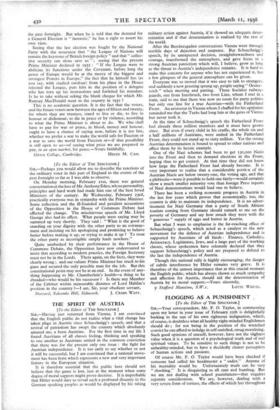THE SPIRIT OF AUSTRIA
[To the Editor of THE SPECTATOR.]
Sta,—Having just returned from Vienna, I am convinced that the English public do not realise what a vital change has taken place in Austria since Schusclutigg's speech, and that a revival of patriotism has swept the country which absolutely amazed me, a born Austrian. For the first time in my life I found Austrians of all classes feeling, thinking and speaking to one another as Austrians united in the common conviction that there was for the present only one issue : the fight for Austrian independence. It is too early to say whether or not it will be successful, but I am convinced that a national move- ment has been born which represents a new and very important feature in the European situation.
It is therefore essential that the public here should not believe that the game is lost, just at the moment when some degree of moral support might prove decisive. It is improbable that Hitler would dare to reveal such a profound disunity in the German speaking peoples as would be displayed by his taking
military action against Austria, if it showed an adequate deter- mination and if that determination is realised by the rest of the world.
After the Berchtesgaden conversations Vienna went through terrible days of dejection and suspense. But Schuschnigg's speech, by its unexpected decision, straightforwardness and courage, transformed the atmosphere, and gave focus to a strong Austrian patriotism which will, I believe, grow as long as the threat to Austria's independence remains It is hard to make this concrete for anyone who has not experienced it, but a few glimpses of the general atmosphere can be given.
Everyone was so moved that it was easy to talk to strangers, and suddenly a new greeting sprang up, people saying " Oester-
reich " when meeting and parting. Three Socialist railway- guards, one from Innsbruck, two from Linz, whom I met in a
train, said to me that there was now no room for party politics but only one line for a true Austrian—with the Fatherland Front. An aristocrat in Vienna whom I chaffed for his optimism reminded me that the Turks had long lain at the gates of Vienna but never took it.
At the time of Schuschnigg's speech the Fatherland Front had already three million members and it must have grown since. But even if every child in his cradle, the whole six and a half millions of Austrians, were united in the Fatherland Front, they could not stand up to sixty million. Yet the strong Austrian determination is bound to spread to other nations and affect them by its heroic example.
One of the Nazi schemes had been to get 15o,00o Nazis into the Front and then to demand elections in the Front, hoping thus to get control. At that time they did not know how large the Fatherland Front had already become. It is very important to realise that a considerable porticn of the Austrian Nazis are below twenty-one, the voting age, and that a plebiscite—were it possible to hold one fairly—would certainly show a much smaller minority vote than foreign Press reports of Nazi demonstrations would lead one to believe.
There has been a striking economic progress in Austria in the last few years which proves that economically, too, the country is able to maintain its independence. It is no adver- tisement for Nazi Germany that a party of South African tourists coming from Germany should remark to me on the poverty of Germany and say how struck they were with the " generous " supply of eggs and butter in Austria.
But what I want to emphasise is the far-reaching effect of Schuschnigg's speech, which acted as a catalyst to the new movement for the defence of Austrian independence and is supported by 'Austrians of all kinds : • Finance, Catholics, Aristocracy, Legitimists, Jews, and a large part of the working classes, whose spokesmen have solemnly declared that they support Schuschnigg's policy and are prepared to defend to the last the independence of Austria.
Though this national rally is highly encouraging, the danger of subtle interference by Hitler remains very grave. It is therefore of the utmost importance that at this crucial moment the English public, which has always shown so much sympathy and affection for Austria, should aid the determination of Austria by its moral support.—Yours sincerely,
9 Stafford Mansions, S.W.r. LOTTE WHYTE.










































 Previous page
Previous page